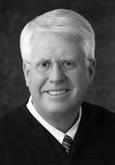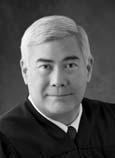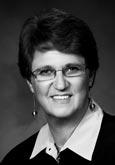







The Judicial Performance Evaluation Commission (JPEC) is responsible for coming up with the recommendation for the judges up for retention. The JPEC is comprised of 13 members that include attorneys, jurors, and court staff who are chosen by the Utah Supreme Court (appoints four members), the Governor (appoints four members), the President of the Senate (appoints two members), and the Speaker of the House of Representatives (appoints two members), along with the executive director of the Commission on Criminal and Juvenile Justice. According to the judges’ website, “the Judicial Performance Evaluation Commission conducts multi-faceted evaluations of judges. A key part of the Commission's evaluation process is a survey of people who have had sufficient experience with a judge to develop an informed opinion about his or her performance.” The website also mentions that the only way for citizens to give their input is by writing a letter to the JPEC or submitting their comments online, since there is a statute about who can be surveyed. However, a new bill is making its way to the 2015 State legislature that would give citizens a chance to have their input be included along with the commission’s recommendations in order to ensure that everyone’s voice is heard regarding the judges.
Below is a list of the judges up for retention in Weber and Box Elder counties, along with a summary of the JPEC’s findings. For a more detailed look at each judge, including those from the Utah Supreme Court and the Utah Court of Appeals, go to http://judges.utah.gov/.
Weber County
Judge Robert J. Dale, District Court Second Judicial District: “He treated all participants with dignity, going beyond common standards of respectful behavior, and he put all participants at ease. Judge Dale also clearly and completely explained all aspects of the proceedings and the reasons for his sentences, and he spent a lot of time ensuring that participants fully understood their charges, the requirements of his sentences, and particularly their rights and the consequences of their pleas.”
Judge David Hamilton, District Court Second Judicial District: “Judge Hamilton was highly skilled at showing his impartiality, but also acted in each participant’s best interest, in some cases struggling with decisions in order to maximize the chance of a defendant’s success. He used clear language, ensured participants understood their rights and anything they were signing, and was alert to misunderstandings and quick to straighten them out. He carefully explained charges and the reasons for his decisions.”
Judge Noel S. Hyde, District Court Second Judicial District: “He took great care in treating all parties in an evenhanded manner, but was also genuinely involved in each case and had each participant’s best interest and well-being at heart, showing his care and concern through his sincere questions and empathy. He showed that he had understood what was said by carefully and precisely summarizing the issues. He ensured that defendants understood his decisions and welcomed questions.”
Judge Thomas L. Kay, District Court Second Judicial District: “Judge Kay treated defendants in the same manner regardless of gender, whether they were in custody, or of a minority group, but he also adapted his style to the type of hearing and the circumstances of each case. He gave all parties time to speak and asked all participants repeatedly if they had input or comments; and he listened thoughtfully and with interest to what he heard. He took time to calmly articulate the law and was transparent and clear when explaining his sentences.”
Judge John R. Morris, District Court Second Judicial District: “Judge Morris treated people as individuals and was concerned for their welfare and rights. Cases moved quickly, but the judge was unhurried and never rushed or interrupted anyone. He listened to and gave consideration to all requests, and he was very good at explaining the law and his decisions.”
Judge Sherene Dillon, Juvenile Court Second Judicial District: “Judge Dillon was patient, accommodating and gracious, put the juveniles at ease, and made participants feel comfortable and safe, but she was also firm and in control. She ensured that defendants understood their rights and the proceedings, asking if they had questions or concerns.”
Judge Michelle Heward, Juvenile Court Second Judicial District: “Judge Heward was truly interested in obtaining the best possible outcomes for all parties, and she ensured that all participants were given adequate and unhurried time to share their thoughts and concerns, and that she listened carefully to and considered their responses. She consistently explained participants’ rights and her decisions in language that was easy to understand, and she gave detailed explanations for the reasons for her decisions.”
Judge Jeffrey J. Noland, Juvenile Court Second Judicial District: “He understood juveniles’ issues and had a good relationship with them, showing his care and compassion in his explanations of his decisions and actions. Judge Noland allowed adequate time for all participants to speak as long as needed, he made participants feel they always had the opportunity to be heard, and they were comfortable speaking their mind to him.”